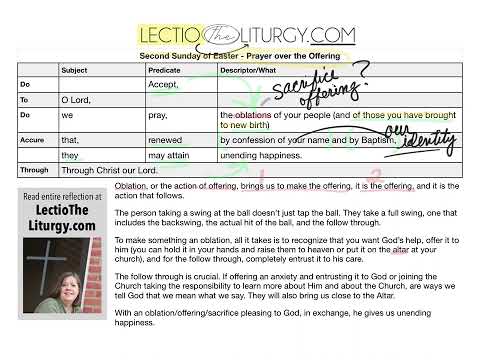Prayer Over the Offering - 2nd Sunday of Easter
Sometimes the English language falls short when translating a word from Hebrew or Greek. We find an example of that that with the word oblation, found in this prayer. This week we Lectio the Liturgy with the Prayer over the Offering for the Second Sunday of Easter.
Accept, O Lord, we pray, the oblations of your people (and of those you have brought to new birth), that, renewed by confession of your name and by Baptism, they may attain unending happiness. Through Christ our Lord.
Let’s start with a quick shout out to those who joined the Church last weekend at Easter Vigil, they are those that our Lord “brought to new birth” last week through the Sacraments of Baptism, Confirmation and first Holy Communion. Welcome! You now have the privilege to join us in this prayer, asking God to accept our oblations.
At our Easter celebration, we all were renewed by confession of His name and by Baptism, as we renewed our baptismal promises. We are now not only able, we want to take ownership of the identity we have in God. It is from this renewal that we offer our oblations to God.
Oblation is a word that we could be quick to think that it means sacrifice or offering. It does mean those those, however, it means more than that.
Oblation is not only the offering, it is the act of offering. Strong’s Concordance also tells us that an oblation is brought near the altar. Our oblation, too, should draw us closer to God.
Oblation, or the action of offering, brings us to make the offering, it is the offering, and it is the action that follows.
For an example, think of golf, or baseball, or tennis. The person taking a swing at the ball doesn’t just tap the ball. They take a full swing, one that includes the backswing, the actual hit of the ball, and the follow through.
Our oblation encompasses a full swing. We recognize our need for God and our need to surrender to him, make the offering, and follow through. We give God a full swing with our oblation.
As a Benediction Oblate, I am an oblation. I felt a desire to be a part of something greater. Truthfully, I fell in love with Conception Abbey, I loved praying with the monks, and when I found out I could join the abbey as an oblate, well, what’s not to love? Almost a year ago, at Conception Abbey, I made promises to the community and now I follow through with prayer and study, both intended to draw me, and the community, closer to God.
Oblations vary by person and by day. Someone may need to offer something to God several times a day. To make something an oblation, all it takes is to recognize that you want God’s help, offer it to him (you can hold it in your hands and raise them to heaven or put it on the alter at your church), and for the follow through, completely entrust it to his care. Your offering may be the health of a loved one, in which case you would offer it to God and leave it in his hands.
As I reflected on oblations, I got a sense that the follow through is crucial. If offering an anxiety and entrusting it to God or joining the Church taking the responsibility to learn more about Him and about the Church, are ways we tell God that we mean what we say. They will also bring us close to the Altar.
Our prayer this week tells us that to attain unending happiness, our oblations need to be accepted by God.
With an oblation pleasing to God, in exchange, he gives us unending happiness. God’s ways are sometimes so surprising. No where in the world today do we find the idea that giving brings happiness. Instead, we are led to believe that getting brings happiness.
A perfect example is found in the season of Easter. In his Passion and death, Jesus gave himself. His sacrifice came with excruciating pain. His giving gave him joy as he rose victorious in the Resurrection, then ascended to the right hand of the Father, where he intercedes, with love and joy, for each one of us.
This week, I challenge you to offer a heart-felt oblation to God. He is the source of unending happiness, go on, give Him a try.
Thanks for praying with m
Julie
